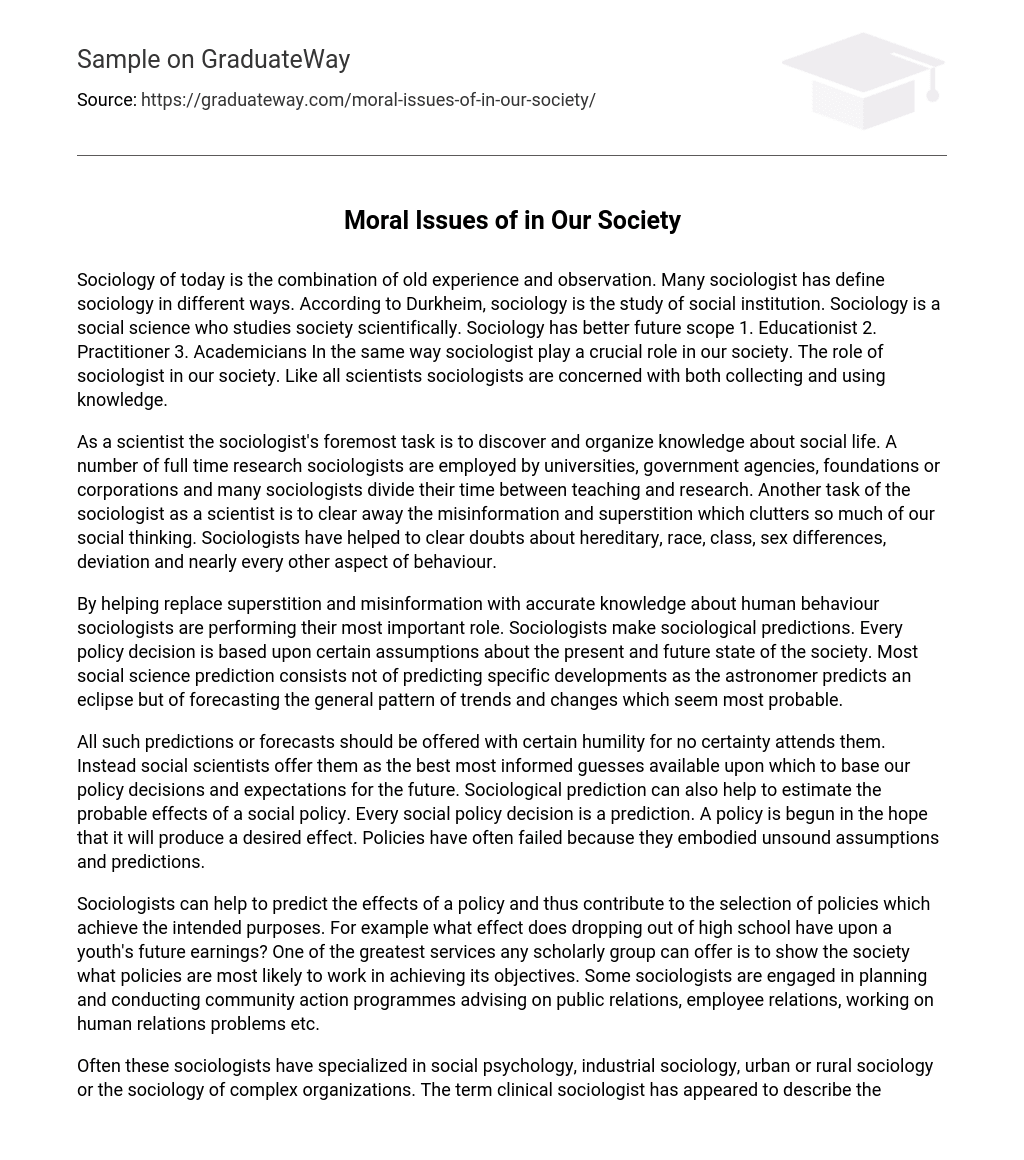Sociology of today is the combination of old experience and observation. Many sociologist has define sociology in different ways. According to Durkheim, sociology is the study of social institution. Sociology is a social science who studies society scientifically. Sociology has better future scope 1. Educationist 2. Practitioner 3. Academicians In the same way sociologist play a crucial role in our society. The role of sociologist in our society. Like all scientists sociologists are concerned with both collecting and using knowledge.
As a scientist the sociologist’s foremost task is to discover and organize knowledge about social life. A number of full time research sociologists are employed by universities, government agencies, foundations or corporations and many sociologists divide their time between teaching and research. Another task of the sociologist as a scientist is to clear away the misinformation and superstition which clutters so much of our social thinking. Sociologists have helped to clear doubts about hereditary, race, class, sex differences, deviation and nearly every other aspect of behaviour.
By helping replace superstition and misinformation with accurate knowledge about human behaviour sociologists are performing their most important role. Sociologists make sociological predictions. Every policy decision is based upon certain assumptions about the present and future state of the society. Most social science prediction consists not of predicting specific developments as the astronomer predicts an eclipse but of forecasting the general pattern of trends and changes which seem most probable.
All such predictions or forecasts should be offered with certain humility for no certainty attends them. Instead social scientists offer them as the best most informed guesses available upon which to base our policy decisions and expectations for the future. Sociological prediction can also help to estimate the probable effects of a social policy. Every social policy decision is a prediction. A policy is begun in the hope that it will produce a desired effect. Policies have often failed because they embodied unsound assumptions and predictions.
Sociologists can help to predict the effects of a policy and thus contribute to the selection of policies which achieve the intended purposes. For example what effect does dropping out of high school have upon a youth’s future earnings? One of the greatest services any scholarly group can offer is to show the society what policies are most likely to work in achieving its objectives. Some sociologists are engaged in planning and conducting community action programmes advising on public relations, employee relations, working on human relations problems etc.
Often these sociologists have specialized in social psychology, industrial sociology, urban or rural sociology or the sociology of complex organizations. The term clinical sociologist has appeared to describe the work of the sociologist as technician. To some extent this is a new name for what sociologists have been doing for a long time but it also includes a considerable broadening of the range of sociologists’ efforts to be useful in society. In such positions the sociologist is working as an applied scientist.
He or she has been engaged to use scientific knowledge in pursuing certain values – a harmonious and efficient working force an attractive public image of the industry or an effective community action programme. Teaching is the major career of many sociologists. In addition to the concerns and problems of teaching in any field, the problem of value neutrality versus value commitment is a particularly acute question. The ethics of university teaching have demanded that the teacher refrain from all conscious indoctrination but it is debatable.
Scientists seek to discover knowledge but should they tell the society how this knowledge should be used? The basic question is whether science specifically sociology should be value-free. For example sociologists know some things about population growth, race relations, urban development and many other matters involving questions of public policy. Early sociologists gave support to all sorts of public policies they believed in. Between 1920 and 1940 many sociologists shifted to the view that sociology should be a more nearly pure science discovering knowledge but not attempting to decree how it should be used.
They sought to build sociology on the model of physics as a value-free science. As such it should be committed to no values except those of free scientific inquiry. Sociologists generally avoided involvement in controversial issues and sought the status of pure social scientists. This view has been challenged in both physical and social science. Many sociologists today believe that sociologists should claim a major role in making decisions about public policy and should involve themselves in the major issues of our society.
They feel that not only do sociologists have a duty to say what society might do about problems of race conflict, population growth, birth control, drug addiction, divorce etc but the sociologists should say what society should do about such problems. Sociologists have agreed upon some of the propositions: Sociologists should show the relationships between values. If we wish to clean up polluted rivers we must be prepared to spend a lot of tax money in doing so. Sociologists may clarify what value sacrifices must be made if we wish to attain certain other values.
A sociologist as an individual may properly make value judgements, support causes and join reform movements like any other citizen. As a scientist the sociologist may not know whether television violence is harmful to children and therefore might not make public recommendations but as a parent will make a decision according to the personal beliefs and values. Beyond this there is no complete agreement among sociologists concerning what role they should assume. Most sociologists have some firm opinions on what policies society should follow and are in considerable agreement with one another upon many of these policies.





